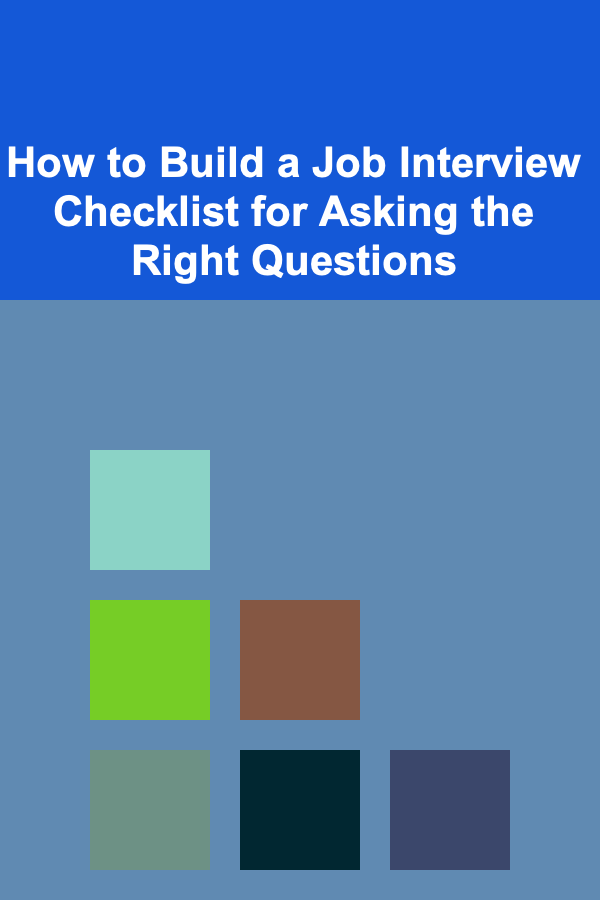
How to Build a Job Interview Checklist for Asking the Right Questions
ebook include PDF & Audio bundle (Micro Guide)
$12.99$6.99
Limited Time Offer! Order within the next:

A job interview is more than just an opportunity for an employer to evaluate a candidate. It's also a chance for the candidate to assess the company, the team, and the job itself. Asking the right questions during an interview is critical to making informed decisions about whether a particular role aligns with your career goals, values, and expectations. Having a well-structured checklist ensures you don't overlook important aspects that could influence your decision.
In this actionable guide, we'll walk you through how to build a job interview checklist that will help you ask the right questions, gain valuable insights, and leave the interview feeling confident about the decision-making process.
Understand the Importance of Asking the Right Questions
Asking questions during a job interview is a two-way street. It shows the employer that you are genuinely interested in the role, the company, and its culture. It also demonstrates your critical thinking and decision-making skills, and it helps you gather the necessary information to make a well-rounded judgment about whether the job is a good fit.
The key to asking the right questions is to focus on areas that align with your career objectives and personal preferences. These can include your desired work environment, company values, team dynamics, and opportunities for growth.
Know Your Goals and Priorities
Before building your checklist, it's important to understand your goals and priorities. These will guide the types of questions you ask, helping you gather the information you truly need. Consider the following:
- Career Development: Are there opportunities for learning and growth?
- Work-Life Balance: What is the company's stance on work-life balance, remote work, and flexibility?
- Company Culture: Do the company values align with your personal values?
- Compensation and Benefits: Are the salary, benefits, and perks in line with your expectations?
- Job Role: Do you fully understand the responsibilities, expectations, and day-to-day tasks of the role?
By identifying what matters most to you, you will be able to structure your questions around these key areas.
Craft Your Checklist: Categories and Questions
Now that you know your priorities, it's time to build your checklist. Below, we've broken down several categories and included sample questions for each, which will help you gather the information you need to make an informed decision.
3.1. Company Culture and Values
Understanding the company's culture is essential to determining if you'll thrive in the environment. Companies that align with your values are more likely to offer a fulfilling and long-term work experience.
- What does success look like at this company?
- How would you describe the work environment here?
- Can you tell me about the company's mission and values? How are they reflected in day-to-day operations?
- What are some common challenges the company has faced in terms of maintaining a positive culture?
- How does the company support diversity and inclusion?
3.2. Team Dynamics
The people you work with can greatly impact your job satisfaction. It's important to learn about the team you'll be joining, how they collaborate, and the management style.
- Can you describe the team I would be working with?
- How does the team typically communicate and collaborate?
- What's the team's biggest achievement in the last year?
- What's the management style of the person I'd be reporting to?
- How does the company ensure cross-department collaboration?
3.3. Job Role and Responsibilities
Ensure you have a clear understanding of the role you're interviewing for. Clarify the expectations, scope of responsibilities, and potential challenges before you accept an offer.
- What are the immediate priorities for someone in this role?
- How do you define success for this position in the first 6 months?
- Are there any ongoing projects that I would be involved in right away?
- Can you walk me through a typical day or week in this role?
- What are the biggest challenges someone in this role might face?
3.4. Career Growth and Development
It's essential to understand how the company supports its employees' professional development. This is especially important if you're aiming for long-term career growth.
- What opportunities are there for professional development and advancement?
- How does the company support continued education or certifications?
- Are there opportunities to take on additional responsibilities or cross-train in other departments?
- What's the typical career progression for someone in this role?
- How does the company support internal mobility and growth?
3.5. Work-Life Balance
A sustainable work-life balance is crucial to maintaining your mental health and job satisfaction. It's important to learn about the company's approach to this balance.
- How does the company support work-life balance?
- What's the general expectation around overtime or weekend work?
- Do employees have flexibility in choosing their work hours or location?
- What's the company's stance on vacation time and personal leave?
- How does the company address burnout or stress among employees?
3.6. Compensation, Benefits, and Perks
Compensation isn't just about the salary; it includes benefits, stock options, retirement plans, and other perks. These are important to evaluate before accepting a job offer.
- What is the salary range for this position?
- What benefits does the company offer (e.g., health insurance, retirement plans, bonuses)?
- Does the company provide stock options or equity for employees?
- What kind of perks or wellness programs does the company provide?
- Are there opportunities for performance-based bonuses or raises?
3.7. Workplace Environment and Tools
Ask about the resources, tools, and technologies available to you in your role. It's crucial to know whether the company provides the support you need to be successful.
- What tools and technologies does the company use to support remote or hybrid work?
- Is there a budget for professional tools or continued learning?
- How does the company stay up-to-date with industry advancements?
- What kind of office space or remote work environment does the company provide?
- What support systems are in place for employees working remotely?
Prepare Follow-Up Questions
Sometimes, a single question leads to a deeper conversation, and you may want to ask additional follow-up questions. Be prepared to dig deeper into topics that are important to you. Here are some strategies for asking effective follow-up questions:
- Clarify Ambiguities: If something wasn't fully answered, politely ask for more details. For example, "Could you expand a bit on what success looks like in this role?"
- Seek Examples: If they mention something important like company culture or a project, ask for specific examples. For instance, "Can you provide an example of how the team collaborated during a recent project?"
- Challenge Their Answers: If something sounds too good to be true, respectfully challenge it with questions that prompt more details. For instance, "You mentioned the company's commitment to work-life balance---can you provide an example of how this is achieved in practice?"
Organize and Prioritize Your Questions
It's easy to get carried away and ask too many questions during an interview. To avoid overwhelming your interviewer or missing out on key topics, prioritize your questions. Focus on the most crucial topics first, then use your remaining time to ask follow-up questions or less urgent inquiries.
Tips for Organizing Your Questions:
- Group Similar Questions: Cluster your questions into themes such as company culture, career development, or compensation to streamline the conversation.
- Be Mindful of Time: Make sure you are respectful of the interviewer's time by keeping your questions concise and prioritizing the most important ones.
- Leave Space for Spontaneity: While a checklist is important, try to remain flexible and open to follow-up questions based on the conversation's flow.
Evaluate the Answers You Receive
The way an interviewer answers your questions is just as important as the answers themselves. Evaluate the following when listening to responses:
- Honesty: Do they provide clear and honest answers, or do they seem evasive?
- Specificity: Are their answers detailed and grounded in examples, or are they vague?
- Alignment with Your Values: Do their answers resonate with your personal values and priorities?
- Company Transparency: Does the company seem open about challenges, opportunities, and expectations?
Review and Reflect Post-Interview
After the interview, take time to reflect on the answers you received. Compare them to your initial priorities and decide if the role and company align with your career goals. If you have any lingering doubts, consider following up with additional questions to clarify.
Building a job interview checklist tailored to your needs is a vital part of the interview process. It ensures you ask insightful questions that give you a better understanding of the role, the company, and the overall fit. By being prepared and asking the right questions, you can make a more informed decision that will have a positive long-term impact on your career.
Other Products

How to Balance Saving and Spending on a Tight Budget
Read More
How to Make Your Kitchen Look Bigger and More Inviting
Read More
How to Manage Noise Between Bedrooms in Shared Homes
Read More
How to Pet-Proof Your Home for New Pet Owners
Read More
How to Turn Your Attic Into Usable Space
Read More